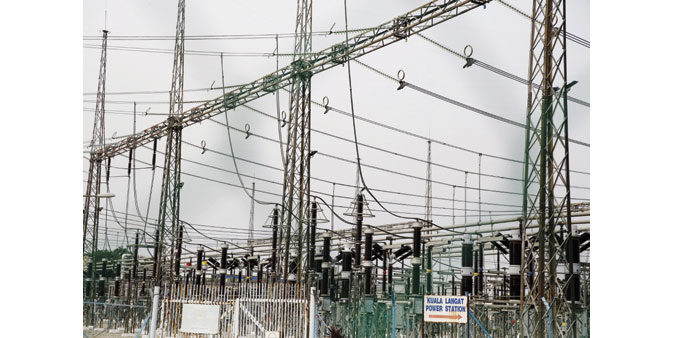A signboard is seen at one of the entrances to Kuala Langat Power Plant, majority owned by 1MDB, in Banting outside Kuala Lumpur. The Malaysian firm yesterday agreed to sell all its energy assets to China General Nuclear Power Corporation and its subsidiaries for $2.3bn, a key step in the embattled state fund’s drive to cut its debts.
Reuters
Kuala Lumpur
Malaysian state fund 1MDB has agreed to sell its energy business in a $2.3bn cash deal to China General Nuclear Power Corp (CGN), as it seeks to cut its debt and restore investor confidence in the Southeast Asian country.
An international probe into alleged graft at 1Malaysia Development Bhd (1MDB), along with weak global fuel prices and subdued demand from China, has damaged investor sentiment in Malaysia and battered its currency. 1MDB has denied any wrongdoing.
Prime Minister Najib Razak, who chairs 1MDB’s advisory board, has been under intense pressure to quit as his opponents blamed mismanagement at the fund for its $11bn debt that has contributed to a 19% drop in the ringgit this year, Asia’s worst performing currency.
“The 1MDB news does at least resolve one of the issues which have affected the ringgit,” Michael Wan, Singapore-based economist at Credit Suisse said yesterday, adding that a clear timeline to sell the assets is a positive in itself.
The deal was announced yesterday just hours after Chinese Premier Li Keqiang ended a visit to Malaysia, where he held bilateral talks with Najib.
State-owned CGN said it will assume all the debt of 1MDB’s power unit, Edra Global Energy Bhd, the largest independent power producer in Bangladesh and Egypt and the second-biggest in Malaysia, and the deal is expected to be completed in February.
Analysts say the deal will substantially reduce 1MDB’s debt but the company did not say by how much.
Yesterday’s agreement supports the restructuring plans of energy-to-real estate fund 1MDB, which will sell all its assets and eventually dismantle the firm.
Edra, which also holds assets in the United Arab Emirates and Pakistan through joint ventures, had drawn interest from at least half a dozen suitors.
“CGN Group was a clear winner in this international tender, based on the objectives announced by 1MDB previously...,” 1MDB President Arul Kanda said in a joint statement with CGN and Edra.
“The purchase by CGN Group brings a significant foreign direct investment commitment to Malaysia and is a clear vote of confidence in the Malaysian economy,” he said.
The companies said the sale was the largest announced M&A transaction in Malaysia and one of the largest in the Asian power sector, this year.
During Li’s visit, China also agreed to buy more Malaysian government bonds and give the country a 50bn yuan ($7.83bn) quota to invest in Chinese stocks and bonds as it looks to strengthen ties with Southeast Asia.
Sources had expected national power firm Tenaga Nasional to be the front-runner to buy Edra, partly because ownership laws in Malaysia’s power sector don’t allow more than a 49% stake to foreign firms and Tenaga was the biggest player. Recently, Qatari energy firm Nebras was also linked to Edra’s assets.
A source familiar with the deal said 1MDB had managed to get a waiver of the ownership rules, helping the companies to seal the deal.
The sale is a big win for Kanda, the former Gulf-based banker, who took charge this year and immediately undertook a strategic review of 1MDB’s business. He Yu, CGN’s chairman of the board, termed the investment as part of a long-term, global diversification initiative by the company. Shenzhen-headquartered CGN employs over 30,000 staff spread over 34 major subsidiaries and affiliates, its website showed.
Maybank Investment Bank was the financial adviser to 1MDB, while Rothschild was the financial adviser to Edra. HSBC advised CGN Group.

